|
|
|
Sort Order |
|
|
|
Items / Page
|
|
|
|
|
|
|
| Srl | Item |
| 1 |
ID:
138833
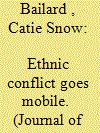

|
|
|
|
|
| Summary/Abstract |
This analysis contributes to the body of research testing the effect of mobile phone availability on the probability of violent conflict by shifting the unit of analysis to that of distinct ethnic groups. This approach provides two important advantages. First, it tests the robustness of this relationship by determining whether this effect maintains when shifted to a more rigorous and theoretically appropriate level of analysis. Second, shifting the analysis to the group level also enables tests of specific characteristics that may condition the effect of mobile phone availability on violent collective action. The first set of characteristics test whether mobile phone availability primarily increases a group’s opportunities to engage in violent collective action as a result of decreased organizational costs due to diminished communication costs. The second set of characteristics explore whether mobile phone availability makes violent collective action more likely as a result of increasing a group’s motivation to organize, thanks to enabling more efficient communication about shared grievances between group members. The results yield mixed support for both of these potential mechanisms, providing needed insight into the dynamics at play in this relationship – a matter that very much remains in the ‘black box’ at this point in time.
|
|
|
|
|
|
|
|
|
|
|
|
|
|
|
|
| 2 |
ID:
151696
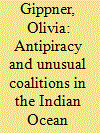

|
|
|
|
|
| Summary/Abstract |
Piracy and threats from non-state actors in the Gulf of Aden have triggered states to cooperate in securing waterways and the sea lines of communication, a development that is fundamentally transforming the region’s maritime security environment. As a result, not only has this region’s strategic importance been reaffirmed, but it has also gained tremendous importance through the presence of several actors, especially China and India. Since 2008, these two countries have been involved in larger global actions against piracy, which has led to increasing contact between their navies and more exposure of their capabilities. Will the broader Indian Ocean region emerge as an area of cooperation or competition between China and India? Drawing on interviews carried out with Chinese and European experts from 2012 to 2015, this article explores the reasons for and instruments of cooperation in antipiracy and the degree to which China uses antipiracy efforts as confidence-building measures.
|
|
|
|
|
|
|
|
|
|
|
|
|
|
|
|
| 3 |
ID:
143344
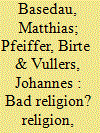

|
|
|
|
|
| Summary/Abstract |
Anecdotal evidence from many armed conflicts suggests that religion incites violence. Theoretically speaking, several facets of religion can create motives and opportunities to overcome the collective action problems associated with organized violence. However, empirical research has hitherto found no conclusive answer on the extent to which religion is connected to armed conflict onset. Contributing to the filling of this gap, we use a new database that incorporates important religious factors that previous studies left largely untested. The data set covers 130 developing countries for the period 1990 to 2010. Results from logistic regressions confirm our expectation that certain religious factors fuel armed conflict—in particular, the overlap of religious and other identities, religious groups’ grievances, and religious leaders’ calls for violence. We also find that religious determinants vary in their impact according to whether conflicts are religious or not in origin.
|
|
|
|
|
|
|
|
|
|
|
|
|
|
|
|
| 4 |
ID:
120643


|
|
|
|
|
| Publication |
2012.
|
| Summary/Abstract |
The vision of the Global Earth Observation System of Systems (GEOSS) is the achievement of societal benefits through voluntary contribution and sharing of data, metadata and products at no or minimum cost. Such undertakings, where contribution provides positive externalities, benefiting contributors and non-contributors alike, are often described as 'social dilemmas', usually resulting in small levels of voluntary contribution. We investigate the benefits and challenges of voluntary contribution to GEOSS, surveying economic and game theoretic literature and examining how the concepts of social dilemmas apply to the provision of GEOSS. We conduct an exploratory survey among individuals involved in the Group on Earth Observation (GEO) to understand their perception of voluntarily contribution. Even though contribution to GEOSS was perceived as rather low, e.g. because of a perceived lack of funds, commitment or organization, survey respondents also perceived many (exclusive) benefits of contribution, e.g. networking, visibility for their work or collaborating with motivated individuals. To increase participation, respondents suggested increasing financial support and raising awareness of GEOSS. We conclude that communicating the efficacy of individuals' contributions, the personal benefits of contribution and strengthening of group identity and knowledge about fellow participants' work can constitute incentives for future voluntary contribution. This could be facilitated by an externally established institution providing a framework for cooperation, or by institutions, agreements or frameworks agreed upon by contributors themselves.
|
|
|
|
|
|
|
|
|
|
|
|
|
|
|
|
| 5 |
ID:
173890


|
|
|
|
|
| Summary/Abstract |
While the evolving nature and proliferation of UN peacekeeping operations in the post-Cold War period is well documented, we know less about how personnel are recruited for these missions. Furthermore, recent developments have rendered existing supply-side explanations for troop contributions less convincing. The increasing demand for personnel, along with stagnant UN reimbursement rates and the rising costs of participation that began during the 1990s, mean that it is less attractive than ever for developing countries to offer their own troops to what have become increasingly ambitious operations. Yet, we see a large pool of developing countries continuing to do so. To address this puzzle, we argue that UN member states with strong preferences for establishing peacekeeping missions have begun using foreign aid as an inducement to help potential contributors overcome the collective action problem inherent in multilateral peacekeeping operations. We uncover strong empirical evidence that these ‘pivotal states’ strategically allocate foreign aid to persuade contributing states to boost their contributions, and also to ensure that these missions continue to be staffed and maintained as costs rise, particularly during the post-1999 period. We also find that states are responsive to these financial inducements: foreign aid increases both the likelihood of contributing personnel and the size of a state’s contribution. Theoretically, this article advances the scholarly understanding of international organizations and cooperation by illuminating an informal, extra-organizational strategy by which IOs can facilitate cooperation.
|
|
|
|
|
|
|
|
|
|
|
|
|
|
|
|
| 6 |
ID:
158491


|
|
|
|
|
| Summary/Abstract |
We explore the relationship between capacity for collective action and representation in autocracies with data from Imperial Russia. Our primary empirical exercise relates peasant representation in new institutions of local self-government to the frequency of peasant unrest in the decade prior to reform. To correct for measurement error in the unrest data and other sources of endogeneity, we exploit idiosyncratic variation in two determinants of peasant unrest: the historical incidence of serfdom and religious polarization. We find that peasants were granted less representation in districts with more frequent unrest in preceding years—a relationship consistent with the Acemoglu-Robinson model of political transitions and inconsistent with numerous other theories of institutional change. At the same time, we observe patterns of redistribution in subsequent years that are inconsistent with the commitment mechanism central to the Acemoglu-Robinson model. Building on these results, we discuss possible directions for future theoretical work.
|
|
|
|
|
|
|
|
|
|
|
|
|
|
|
|
| 7 |
ID:
174600
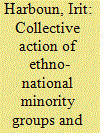

|
|
|
|
|
| Summary/Abstract |
Collective action requires resources, organization, leaders and political opportunities. In the case of disadvantaged minority groups, long-standing conflict with the majority, a closed political opportunity structure and the difficulty of acquiring resources, increases the costs and risks of the action. We argue that the development of such an action is a function of leaders’ perceptions about the cost of inaction (COI) and symbolic resources of the group, such as solidarity. Combining these evaluations creates three trajectories: growth, restriction and decline. We examine this argument by four collective actions carried out by Arab Palestinians citizens in Israel to improve education. The findings show that leaders increased efforts even if they assessed opportunities are limited when they thought that COI is high, since inaction means not only the loss of instrumental costs but also the loss of potential symbolic gains such as recognition of the group collective identity.
|
|
|
|
|
|
|
|
|
|
|
|
|
|
|
|
| 8 |
ID:
071631


|
|
|
|
|
| Publication |
2006.
|
| Summary/Abstract |
This article examines how states attempt to overcome collective action problems for promoting regional integration, by highlighting such attempts by members of the Association of Southeast Asian Nations (ASEAN). It considers two kinds of collective action problems: collaboration games where actors are lured to defect from an agreement in order to obtain short-term gains, and coordination games where actors face difficulty in reaching an agreement. The article argues that although ASEAN countries have not intended to establish a supranational body to resolve collective action problems, they have gradually developed feasible enforcement mechanisms by intensifying the centralized nature of regional organization. It also contends that some member states have begun to play a focal point role in resolving coordination problems resulting from accelerated regional integration and market liberalization, and the resolution of coordination problems has been pursued in a framework where extra-regional countries and environments play a significant role.
|
|
|
|
|
|
|
|
|
|
|
|
|
|
|
|
| 9 |
ID:
110560
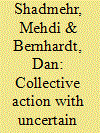

|
|
|
|
|
| Publication |
2011.
|
| Summary/Abstract |
How can one analyze collective action in protests or revolutions when individuals are uncertain about the relative payoffs of the status quo and revolution? We model a "calculus of protest" of individuals who must either submit to the status quo or support revolt based only on personal information about their payoffs. In deciding whether to revolt, the citizen must infer both the benefit of successful revolution and the likely actions of other citizens. We characterize conditions under which payoff uncertainty overturns conventional wisdom: (a) when a citizen is too willing to revolt, he reduces the incentives of others to revolt; (b) less accurate information about the value of revolution can make revolt more likely; (c) public signals from other citizens can reduce the likelihood of revolt; (d) harsher punishment can increase the incidence of punishment; and (e) the incidence of protest can be positively correlated with that of repression.
|
|
|
|
|
|
|
|
|
|
|
|
|
|
|
|
| 10 |
ID:
121132
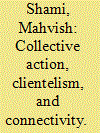

|
|
|
|
|
| Publication |
2012.
|
| Summary/Abstract |
Backed by studies finding only limited propensity for free-riding when communities have an interest in self-provision, the last few decades have seen a surge of interest in community-based development. A major caveat to the "second wave" of collective action studies, however, is that collective action often breaks down under hierarchical social relationships. This is unfortunate news for developing countries' rural societies, which are often entrenched in patron-client networks. Using a natural experiment found in the construction of a motorway, the article finds that clientelist relationships do not, in and by themselves, block peasant collective action. Rather, it is the interaction between clientelism and isolation that empowers patrons to block community-based projects. Peasants in connected villages face no such constraints, but instead rely on their patrons' assistance in collective projects, making the hierarchical network an additional resource.
|
|
|
|
|
|
|
|
|
|
|
|
|
|
|
|
| 11 |
ID:
143651
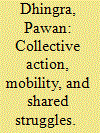

|
|
|
|
|
| Summary/Abstract |
The model minority remains one of the most durable images assigned to immigrant groups despite ample critiques of it. Those persons considered to be a model minority often promulgate the myth themselves. Common arguments against the stereotype do not effectively speak to these people. In this article I demonstrate the disconnect between the critiques of the stereotype and the views of Indian American professionals, a group widely considered to be a model minority. I then offer an alternative approach to dismantling the stereotype that can resonate more with those invested in it. This approach highlights groups’ history of collective action in response to racialised and class obstacles. Three case studies illustrate this approach: study of Indian American motel owners, of physicians, and of taxi drivers. Taxi drivers are thought to be on the opposite end of the model minority binary than doctors and successful motel owners. The case studies highlight the grassroots activism shared by all three groups.
|
|
|
|
|
|
|
|
|
|
|
|
|
|
|
|
| 12 |
ID:
157490
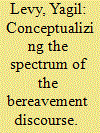

|
|
|
|
|
| Summary/Abstract |
This article presents the spectrum of the bereavement discourse, namely, how various social groups interpret the loss of their children’s lives or the potential risk to their lives posed by their military service and translate it into public discourse, as a spectrum of attitudes. It is argued that this spectrum ranges from subversive to submissive approaches. Furthermore, within the confines of the declining casualty tolerance, two variables cumulatively determine the actors’ choice of discourse: the level of enforcement of recruitment, ranging from conscription to voluntary recruitment, and the social position of the group to which the agents belong. Given that conscription brings powerful, high-status groups into the ranks who may be unwilling to make sacrifices for war, subversive responses are more likely to occur in conscript militaries than in volunteer forces and vice versa. This article maps this spectrum and hypothesizes about its determinants.
|
|
|
|
|
|
|
|
|
|
|
|
|
|
|
|
| 13 |
ID:
138832
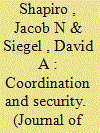

|
|
|
|
|
| Summary/Abstract |
Recent work has shown that the introduction of mobile communications can substantially alter the course of conflict. In Afghanistan and India targeting mobile communications is a central part of the insurgent campaigns. The opposite was true in Iraq. There insurgents instead threatened providers who did not do enough to maintain mobile phone networks. These differences likely arise from two competing effects of mobile communications: they make it easier for antigovernment actors to coordinate collective action, thereby increasing violence, and for pro-government civilians to collaborate with security forces allowing them to more effectively suppress rebels, thereby decreasing violence. To study these competing effects we analyze a formal model of insurgent action in which changes in the communications environment alter both (i) the ability of rebels to impose costs on civilians who cooperate with the government and (ii) the information flow to government forces seeking to suppress rebellion with military action. Our analysis highlights the importance of the threat of information sharing by non-combatants in reducing violence and offers some guidelines for policymakers in thinking about how much to support ICT development in conflict zones. In particular, we show that officials can generate reasonable expectations about whether expanding ICT access will exacerbate conflict or reduce it by assessing the relative gains to both sides from changes in ICT access along several simple dimensions.
|
|
|
|
|
|
|
|
|
|
|
|
|
|
|
|
| 14 |
ID:
190027
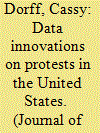

|
|
|
|
|
| Summary/Abstract |
For decades, the United States has been generally excluded from cross-national quantitative datasets on the study of collective action and political resistance. More recently, however, new data collection efforts are on the rise. These projects specifically focus on gathering granular level information about street protests and mobilizations in the United States. In this article, we conduct a rigorous exploratory data analysis of three contemporary protest datasets. These data collect information about the when, where and how of contentious politics in the United States. Our thorough data review first summarizes the key similarities and differences across the datasets. Next, we review the regional, temporal and methodological strengths and weaknesses of each dataset both individually and in contrast to one another. Last, we examine potential research applications of these data by demonstrating what these data reveal about the risks of protesting in these types of events. We conclude by offering recommendations for data use and future data collection strategies for the study of collective action.
|
|
|
|
|
|
|
|
|
|
|
|
|
|
|
|
| 15 |
ID:
141442


|
|
|
|
|
| Summary/Abstract |
This article will work towards a multi-level collective action approach for understanding the deployment of Common Security and Defence Policy (CSDP) military operations. It is multi-level because it uses three levels of analysis: firstly, the international level, where events that create threats to certain values catalyze the process leading to the deployment of an operation; secondly, the national level, where EU governments formulate their national preferences towards prospective deployments based on utility expectations; and thirdly, the EU level, where EU member states negotiate and seek compromises to accommodate their different national preferences. The strength of the model will be demonstrated through empirical case studies on the deployment processes of EUFOR Althea in Bosnia and Herzegovina and EU NAVFOR Atalanta off the coast of Somalia. The article will also provide an overview of the existing theoretical literature on the deployment of CSDP military operations.
|
|
|
|
|
|
|
|
|
|
|
|
|
|
|
|
| 16 |
ID:
146151


|
|
|
|
|
| Summary/Abstract |
This article examines the impact of military unit composition on desertion in civil wars. I argue that military units face an increased risk of desertion if they cannot develop norms of cooperation. This is a challenging task in the context of divided and ambiguous individual loyalties found in civil wars. Norms of cooperation emerge, above all, from soldiers sending each other costly signals of their commitment. Social and factional ties also shape these norms, albeit in a more limited fashion. Hence, unit composition can serve as an intervening variable explaining how collective aims can sometimes induce individual soldiers to keep fighting. Analyzing original data from the Spanish Civil War (1936–1939), I demonstrate that three characteristics of a military unit's composition—the presence of conscripts rather than volunteers, social heterogeneity (whose effect is found to be limited to volunteer units), and polarization among factions—increase the individual soldier's propensity to desert. Unit composition proves at least as important as individual characteristics when explaining desertion. This analysis indicates the usefulness of moving beyond commonly used atomistic understandings of combatant behavior. Instead, it suggests the importance of theoretical microfoundations that emphasize norms of cooperation among groups of combatants.
|
|
|
|
|
|
|
|
|
|
|
|
|
|
|
|
| 17 |
ID:
072715
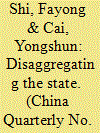

|
|
|
|
|
| Publication |
2006.
|
| Summary/Abstract |
Collective action directed at the government is not rare in China, but why some actions endure and succeed whereas many others fail remains inadequately addressed. Based on a case of home owners' sustained collective resistance in Shanghai, this study finds that state power is fragmented at the local level. While the disparate priorities among different levels of state authorities provide opportunities for resistance, social networks between participants of collective action and officials or media workers may significantly help the former to achieve success.
|
|
|
|
|
|
|
|
|
|
|
|
|
|
|
|
| 18 |
ID:
141817


|
|
|
|
|
| Summary/Abstract |
Numerous recent field and laboratory experiments find that elections cause higher subsequent levels of collective action within groups. This article questions whether effects observed in these novel environments apply when traditional institutions are democratized. The authors test the external validity of the experimental findings by examining the effects of introducing elections in an indigenous institution in Liberia. They use a break in the process of selecting clan chiefs at the end of Liberia’s civil wars to identify the effects of elections on collective action within communities. Drawing on survey data and outcomes from behavioral games, the authors find that the introduction of elections for clan chiefs has little effect on community-level and national-level political participation but that it increases contentious collective action and lowers levels of contributions to public goods. These findings provide an important counterpoint to the experimental literature, suggesting that elections have less salutary effects on collective action when they replace customary practices.
|
|
|
|
|
|
|
|
|
|
|
|
|
|
|
|
| 19 |
ID:
162352
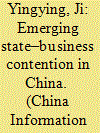

|
|
|
|
|
| Summary/Abstract |
Based on an in-depth case study of a business association, this article explores how private entrepreneurs are organizing for their rights and highlights contentious facets of the state–business relationship in China. In contrast to depictions common in the literature, this business association actively asserts and seeks to maintain its autonomy vis-a-vis the state and uses innovative strategies to strengthen its own organizational cohesion. It organizes collective actions to defend members’ interests and to enhance the transparency and accountability of the local government. It even advances universal values, such as equal rights to justice. Importantly, however, the initiation and effects of collective actions are contingent on the opportunities embedded in China’s fragmented governance structure. I argue that corporatist analyses characterizing Chinese business associations as lacking autonomy and as partners of the state have overlooked such associations’ potential to engage in confrontations with the state. Combining involvement in the formal institution and contentious collective actions, the association studied displays the tension between the incorporation system and social resistance in contemporary China.
|
|
|
|
|
|
|
|
|
|
|
|
|
|
|
|
| 20 |
ID:
067278
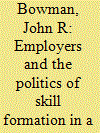

|
|
|
|
|
|
|
|